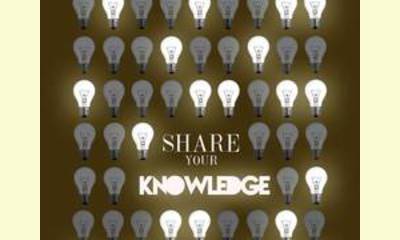|
|
Las publicaciones de la UNESCO, disponibles de forma gratuita como parte de la nueva política de acceso abierto de la Organización
an article by UNESCO Servicio de Prensa
La UNESCO pondrá sus publicaciones digitales a
disposición de millones de personas alrededor del
mundo, sin costo y con licencia abierta. Tras la
decisión adoptada por el Consejo Ejecutivo de la
Organización en abril, la UNESCO se convierte en
el primer miembro de las Naciones Unidas en
adoptar una política de Acceso Abierto para sus
publicaciones. La nueva política significa que
cualquier persona podrá descargar, traducir,
adaptar, distribuir y volver a compartir las
publicaciones y los datos de la UNESCO sin costo
alguno.

click on photo to enlarge
Janis Karklins, Subdirector General de
Comunicación e Información de la UNESCO, anunció
la nueva política durante la inauguración del Foro
de la Cumbre Mundial sobre la Sociedad de la
Información, el 13 de mayo en Ginebra:
“Investigadores de todos los países, pero
principalmente de países en desarrollo y países
menos desarrollados se beneficiarán y
capitalizarán el acceso abierto al conocimiento”,
dijo. “Nuestra nueva política nos permitirá
incrementar la visibilidad, accesibilidad y la
rápida distribución de nuestras publicaciones”,
agregó.
Con la adopción de esta nueva política, la UNESCO
alinea su práctica a su labor de promoción en favor
del acceso abierto y refuerza su compromiso con el
acceso universal a la información y el conocimiento.
El movimiento Acceso Abierto nació en la comunidad
científica para hacer frente a los crecientes
costos de la literatura científica, esencial para
los investigadores. Un amplio grupo de
universidades, instituciones y gobiernos apoyan
esta iniciativa, alternativa al modelo tradicional
de difusión del conocimiento a través de costosas
revistas académicas.
A partir de julio de 2013, será posible descargar
libremente cientos de publicaciones digitales de
la UNESCO a través de un nuevo Repositorio de
Acceso Abierto (Open Access Repository) que
dispondrá de una interfaz multilingüe. Todas las
nuevas publicaciones se difundirán con licencia
abierta. La UNESCO también busca la manera de
aplicarla de forma retroactiva, es decir,
proporcionar licencia abierta a obras ya
publicadas. Las publicaciones para las que la
UNESCO firmó acuerdos especiales con las
editoriales colaboradoras no se verán afectados en
un primer tiempo. En todo caso, se animará a que
las editoriales externas se adhieran a esta nueva
política.
Al defender el acceso abierto a las publicaciones,
la UNESCO refuerza uno de los objetivos
fundamentales de una organización
intergubernamental: asegurarse de que el
conocimiento que cree esté a disposición del
público de la manera más amplia posible.
El texto completo de la nueva política de libre
acceso a las publicaciones de la UNESCO puede
consultarse aquí.
La nueva política de publicaciones está en línea
con la estrategia de libre
acceso a la información científica de la
UNESCO y con la promoción de los recursos educativos
abiertos y de los programas informáticos
gratuitos y de código abierto.
[CPNN agradece a la Good News Agency por haber llamado la
atención sobre este artículo. ]
( Clickear aquí para la version inglês o aquí para la version francês)
|








|
DISCUSSION
Question(s) related to this article:
Free flow of information, How is it important for a culture of peace?
* * * * *
Latest reader comment:
Perhaps the simplest way to illustrate the essential importance of free flow of information for a culture of peace is to discuss the importance of the control of information for the culture of war.
Here are excerpts from an Washington Post investigation two years ago entitled Top Secret America: A hidden world, growing beyond control. To read the original, click here.
"* Some 1,271 government organizations and 1,931 private companies work on programs related to counterterrorism, homeland security and intelligence in about 10,000 locations across the United States.
* An estimated 854,000 people, nearly 1.5 times as many people as live in Washington, D.C., hold top-secret security clearances.
* In Washington and the surrounding area, 33 building complexes for top-secret intelligence work are under construction or have been built since September 2001. Together they occupy the equivalent of almost three Pentagons or 22 U.S. Capitol buildings - about 17 million square feet of space.
* Many security and intelligence agencies do the same work, creating redundancy and waste. For example, 51 federal organizations and military commands, operating in 15 U.S. cities, track the flow of money to and from terrorist networks.
* Analysts who make sense of documents and conversations obtained by foreign and domestic spying share their judgment by publishing 50,000 intelligence reports each year - a volume so large that many are routinely ignored." . . .
"Every day across the United States, 854,000 civil servants, military personnel and private contractors with top-secret security clearances are scanned into offices protected by electromagnetic locks, retinal cameras and fortified walls that eavesdropping equipment cannot penetrate. . .
Much of the information about this mission is classified. That is the reason it is so difficult to gauge the success and identify the problems of Top Secret America, including whether money is being spent wisely. The U.S. intelligence budget is vast, publicly announced last year as $75 billion, 21/2 times the size it was on Sept. 10, 2001. But the figure doesn't include many military activities or domestic counterterrorism programs."
As we said in the draft Declaration and Programme of Action on a Culture of Peace that we sent from UNESCO to the UN General Assembly in 1998:
"98. It is vital to promote transparency in governance and economic decision-making and to look into the proliferation of secrecy justified in terms of 'national security', 'financial security', and 'economic competitiveness'. The question is to what extent this secrecy is compatible with the access to information necessary for democratic practice and social justice and whether, in some cases, instead of contributing to long-term security, it may conceal information about processes (ecological, financial, military, etc.) which are a potential threat to everyone and which need therefore to be addressed collectively."

|
|









